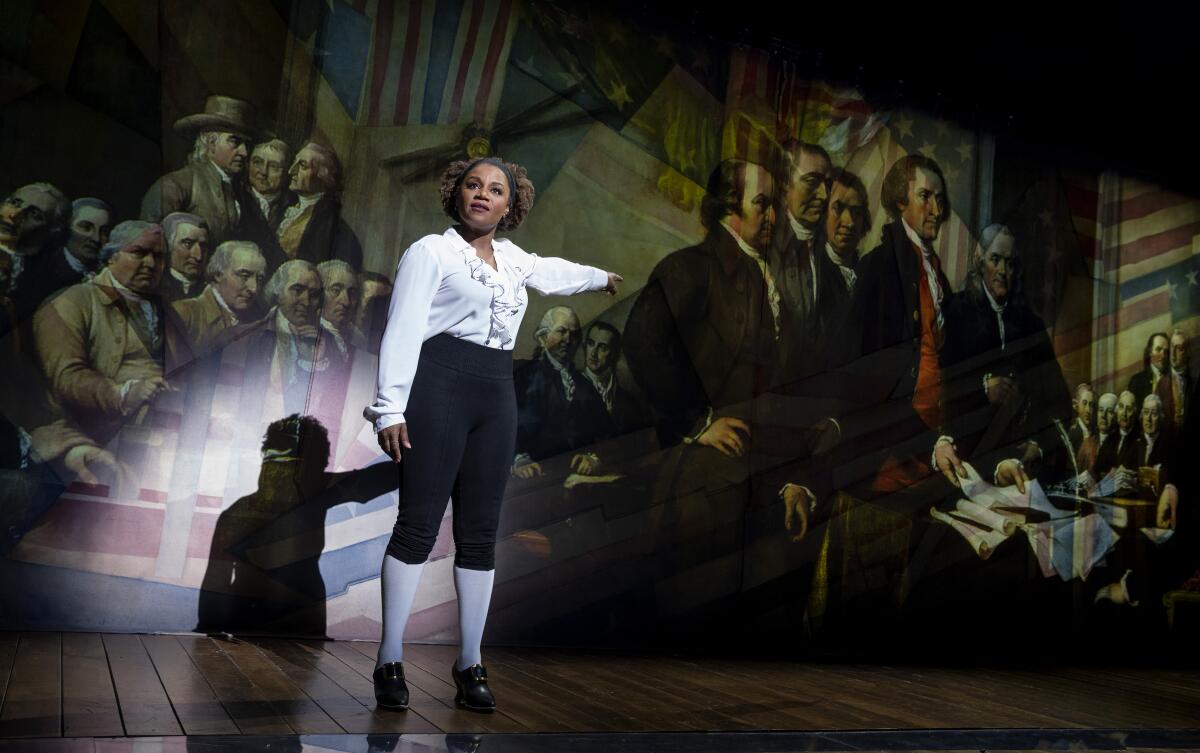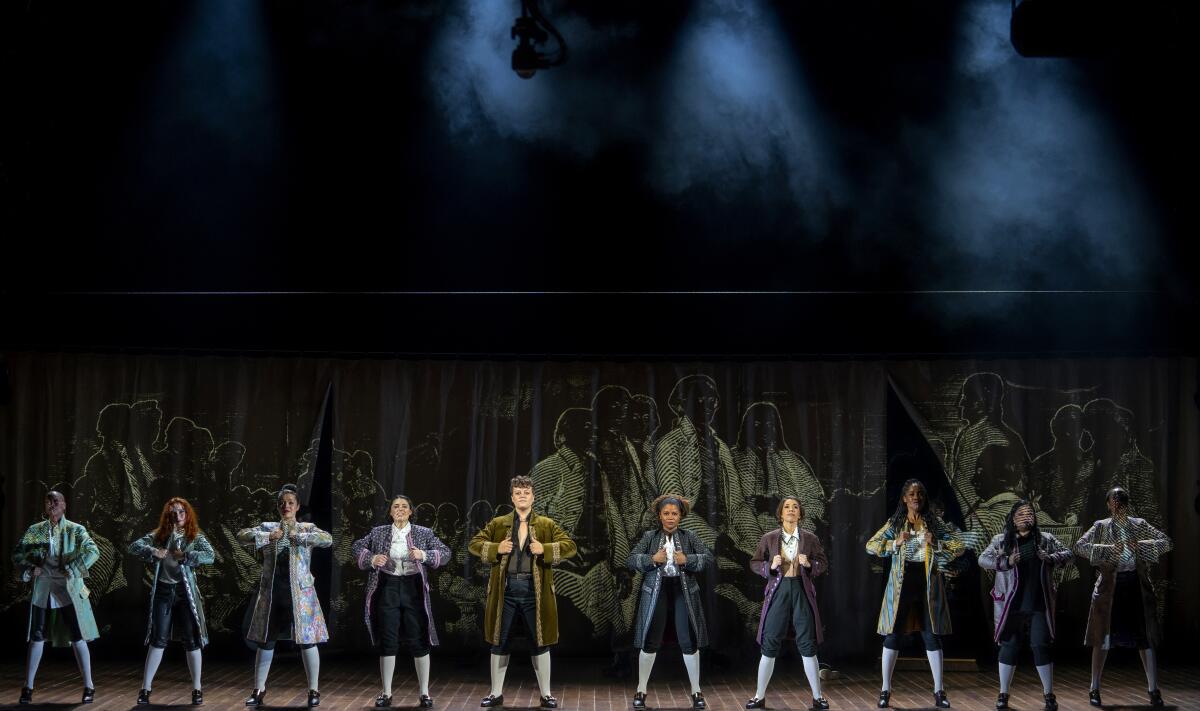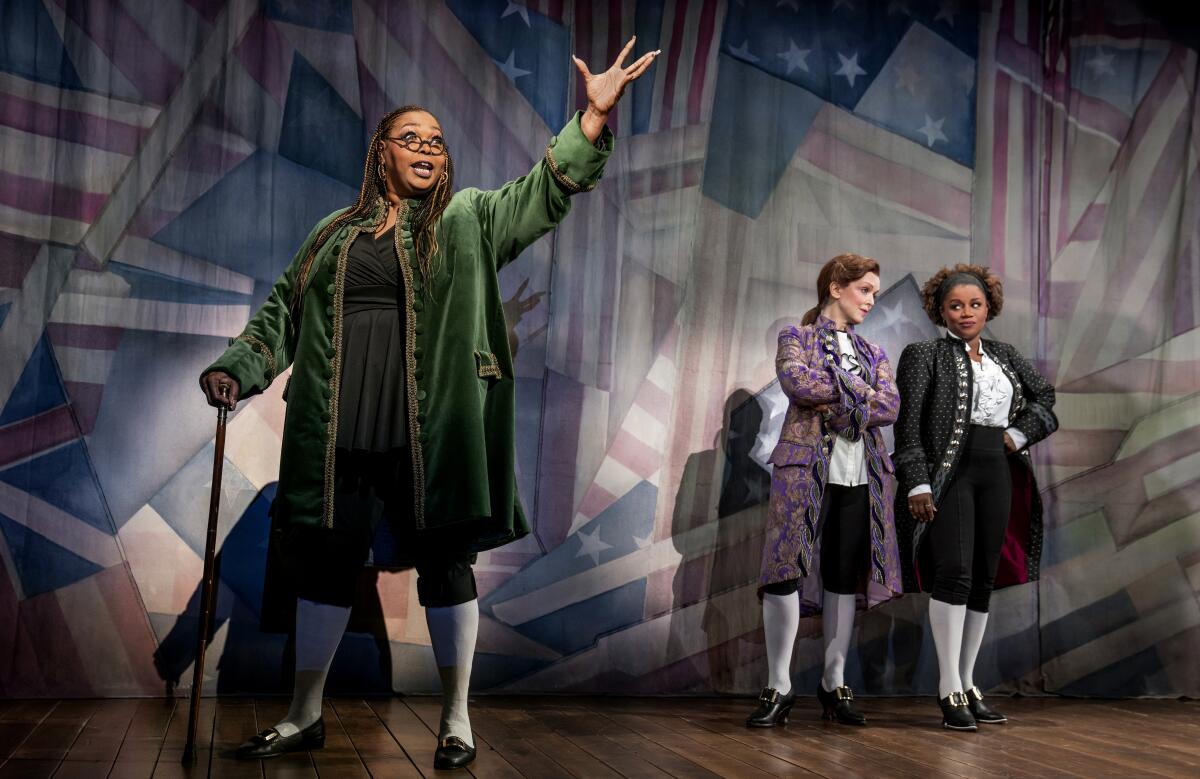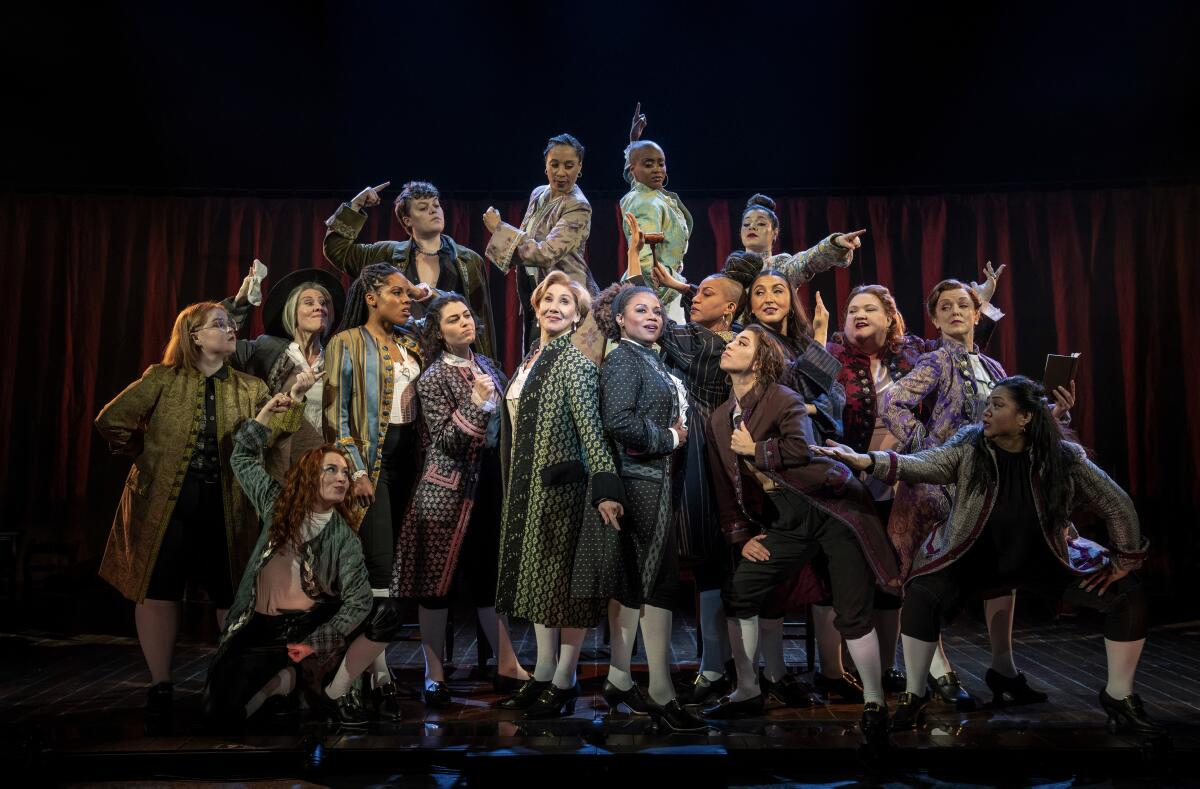Although more like C-SPAN than ‘Hamilton,’ ‘1776’ at Ahmanson is still a solid ride

- Share via
The white men of history have left the building. Jeffrey L. Page and Diane Paulus’ nontraditional, ethnically diverse revival of the Tony-winning musical “1776” — now at the Ahmanson — offers one last glimpse of the pale, powdered Founding Fathers of U.S. textbooks before banishing them completely from the proceedings.
Gisela Adisa — the Black actor who plays John Adams in the national tour — stands alone before a projection of John Trumbull’s painting “Declaration of Independence.” She looks up at it, then glances pointedly over her shoulder at the audience. No words are necessary: That was a chamber full of very white men — unambiguously, homogeneously, monochromatically white, unequivocally, unquestionably, unapologetically men.
There were plenty of people in the Colonies in 1776 who were neither white nor male — they didn’t end up in the paintings or history books because they hadn’t been invited into the chamber. These omissions have caused untold suffering for nearly 250 years, and it’s hard to look back on the Founding Fathers now without seeing the ways they failed the nation America is still struggling to become.

That’s where “1776” comes in. Even in its original form, “1776” isn’t a soft-focus hagiography. Book writer Peter Stone and composer and lyricist Sherman Edwards deliver an unflinching look at the ugly eleventh-hour deadlock over slavery that nearly stopped American independence in its tracks. In an early draft of the Declaration of Independence, Thomas Jefferson slipped in antislavery language. The Southern states wouldn’t sign until he took it out. In its original 1969 staging, the musical suggested that this concession was a necessary evil, the cost of doing business. In the musical, Benjamin Franklin tells John Adams that there’s only so much men can accomplish at one time: “First things first! Independence! America! For if we don’t secure that, what difference will the rest make?”
Fifty years have elapsed since the original musical. In the wake of “Hamilton,” the Trump presidency and the murder of George Floyd, the new revival is definitely less ready to forgive Franklin for his pragmatism — Adams’ reluctance to play ball is the proper attitude. And yet, at the same time, Page and Paulus’ vision isn’t a smear campaign or a bid to invalidate the Founding Fathers’ accomplishments. They made really big mistakes. The equality they promised was a lie. As a result, people have suffered and died. But American history didn’t end in 1776. It’s still going on.
At least in terms of drama, that project starts with getting the white guys out of the picture. They might as well leave their clothes behind, though. After appearing in modern dress, the all-female-identifying, nonbinary and transgender cast members slip on frock coats, pull their white socks up to their knees and step into buckle shoes to become Colonial Americans, only deconstructed and in full color. Emilio Sosa’s costume design brings “Hamilton” to mind, inevitably, as does the nontraditional casting. The process has been fraught: Shortly after the 2022 Broadway production debuted, cast member Sara Porkalob publicly criticized the musical’s treatment of race and gender, especially with how the number “Molasses to Rum” transpired.

“Hamilton” does hover over this “1776,” like an envied and resented older sibling, both a blessing and a curse. If “Hamilton” is not your daddy’s Founding Father musical, “1776” is your daddy’s Founding Father musical. It’s really square. There’s no genre-busting hip-hop; its score is a mixed bag of mostly forgettable numbers with occasionally labored wordplay. The concept itself is counterintuitive: The Colonies are on the brink of war; George Washington is out in the field, preparing to face the mighty British army with a ragtag crew of drunken louts with chilblains; and we’re stuck in a hot, fly-blown room in Philadelphia watching the Second Continental Congress in what feels like real time. “C-SPAN: The Musical,” anyone? Of course, any criticism of “1776” must be tempered by the acknowledgment that it won the Tony for best musical, mysteriously beating “Hair.” (What was that all about? We may never get the full story.)
The first act has a lot of expository work to do, so much so that after a flurry of opening numbers, the show temporarily stops being a musical in order to introduce the delegates, their states’ and their personal positions on independence, and their feelings about one another. Scott Pask’s set with wooden chairs doesn’t add a lot of visual interest to this long conversation. Perhaps as a mnemonic strategy, each delegate is given a quirk, and the cast members here really play up the broad comedy of these characterizations: Stephen Hopkins from Rhode Island (Julie Cardia) swills rum; Pennsylvania’s John Dickinson (Joanna Glushak) is a condescending monarchist; Adams is “obnoxious and disliked”; Franklin (Liz Mikel) is self-congratulatory, pompous and lewd; and Thomas McKean (Dawn Cantwell) has a thick Scottish burr and carries a musket. This segment culminates in a thoroughly campy number by Virginian Richard Henry Lee (Shawna Hamic), which, despite being of questionable narrative value and tonal coherency, delighted the opening-night audience.
For me, this production didn’t really take off until Thomas Jefferson (Nancy Anderson), Adams and Franklin formed their subcommittee to draft the Declaration. The narrower spotlight gives the performers a chance to breathe and to shine. They bounce off one another well. Not being male, they have fun sending up the bawdy “locker-room” dialogue with which Stone liberally supplied our forefathers. For all the courage required to cast these roles in nontraditional ways, I had no trouble accepting these performers as the hoary historical figures I’ve seen represented in oil all my life.

The show, as written, has only two female roles, and they feel jury-rigged: Abigail Adams (Tieisha Thomas) chats with her husband in a series of waking visions, and the flirty soubrette Martha Jefferson (Connor Lyon) is brought in to cure Thomas of his writer’s block through erotic ministrations. These scenes, while playful, felt less necessary now that the main roles are also played by women. The music definitely benefits from subversion in gender roles. Both Adisa and Mikel sing beautifully, and music director Ryan Cantwell’s new orchestrations allow them wonderful opportunities to harmonize.
Although I felt completely on top of the dramatis personae during the second act (that exposition did its job) and could relax into the dry wit of the interactions, I still couldn’t quite get a handle on the overall tone. The characters, who have been established as very silly, start to get into some heavy stuff. In the showstopper “Momma, Look Sharp,” a messenger (Brooke Simpson) delivering a report from the battlefield breaks into a mournful solo from the perspective of a dead soldier, while the rest of the cast croons lugubriously in the shadows. Although gorgeously performed, it feels out of place or tacked on.
“Cool, Cool, Considerate Men,” a minuet performed by snooty conservative Dickinson and his minions, has an arch, cerebral bite of a New Yorker satire (Richard Nixon apparently lobbied for it to be cut). In the over-the-top “Molasses to Rum,” in contrast, Kassandra Haddock indulges in the villainy of her portrayal of pro-slavery South Carolinian Edward Rutledge. In the wake of the confused emotions provoked by these songs, I had a hard time relaxing into the sight of John Hancock taking up all the room on the Declaration with his massive signature.
But if the ride was a bit wobbly, in the end, I liked where this “1776” took me. The message, that the American experiment failed before it even began, isn’t a radical take on history at this point. We’ve been coming around to it now gradually for hundreds of years. We don’t have a lot of illusions left to shatter or sacred cows to tip. What feels fresh, and heartening, is the reminder that we don’t have to be limited forever by the errors of history. We can invite more people to the meeting. We just have to remember that nothing — except Independence Hall — is set in stone.
‘1776’
Where: Ahmanson Theatre, 135 N. Grand Ave., Los Angeles
When: 8 p.m. Tuesdays through Fridays, 2 and 8 p.m. Saturdays, 1 and 6:30 p.m. Sundays (check for exceptions). Ends May 7
Tickets: $40-$155 (subject to change)
Info: (213) 972-4400 or centertheatregroup.org
Running time: 2 hours and 45 minutes, including one intermission
COVID protocol: Masks are recommended. Updates available at centertheatregroup.org/safety
More to Read
The biggest entertainment stories
Get our big stories about Hollywood, film, television, music, arts, culture and more right in your inbox as soon as they publish.
You may occasionally receive promotional content from the Los Angeles Times.










